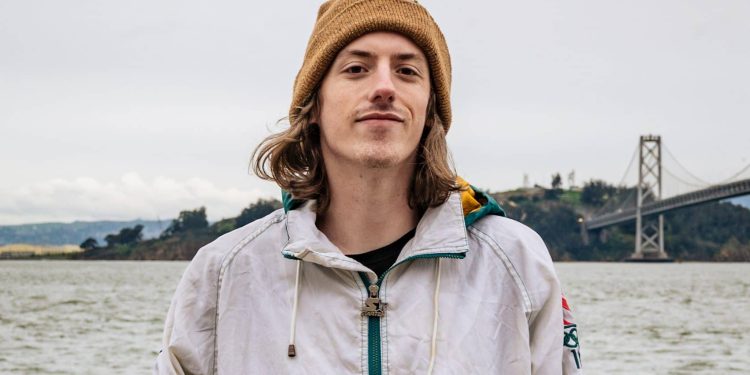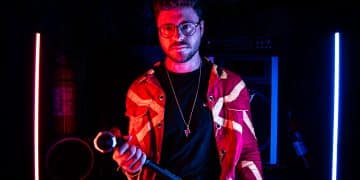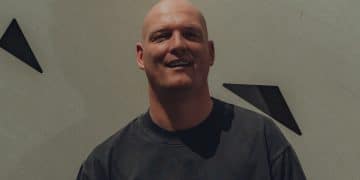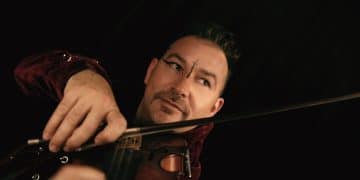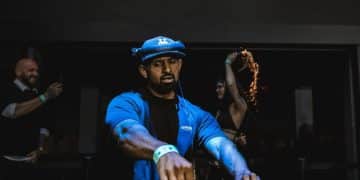EMMBER swung by to dive into their backstory, share their thoughts on LGBTQ+ representation in the scene, and more.
The scene continues to grow each year, and a new wave of artists is looking to shake things up. One of those artists is EMMBER. Originally from Chicago but now residing in Los Angeles, this rising star in the dance music scene has already begun to turn heads with dynamic releases and sets that have kept crowds moving and grooving to the beat.
EMMBER channeled their passion for electronic music in 2016, when they headed to ICON Collective to hone their skills and expand creatively. That was just the start, as recent years have seen them drop tunes like “I Think It’s Time,” “Gaslight,” and “Girls” with TRVESO while continuing to perform electrifying sets that feature tracks from a diverse range of influences.
Amid their journey as a DJ and producer, EMMBER also looked to create a new home for artists and co-founded Better Together Records. This label is where you can find most of their releases, along with curated tunes from other artists, including Nosha, Neuro Dimension, MR. STILØ, and more.
Looking to gain some insight, we caught up with EMMBER to discuss their recent tune with Neuro Dimension, how they balance time between their personal career and working as an A&R, and get their thoughts on the state of representation for LGBTQ+ artists in the scene. Listen to their exclusive guest mix on SoundCloud and read on for the full conversation.
Stream EDMID Guest Mix 468 || EMMBER on SoundCloud:
Hi EMMBER, thanks so much for taking the time to chat with me today. Let’s kick this interview off by diving into your roots. Who were some of the artists who influenced you early on in your life, and what drove your passion for dance music?
I grew up listening to R&B and hip hop as a kid—stuff like Destiny’s Child, TLC, Juvenile, Big Tymers, and Nelly. By the time I got to high school, I was also into alternative stuff like Linkin Park, Limp Bizkit, Papa Roach, and Rob Zombie. In my last few years of high school, I discovered dance music. Trance was the first genre that really pulled me in. I would go to the computer lab at lunchtime and download music from artists like Trance[]Control, Pulsedriver, Infected Mushroom, and Astral Projection.
When I finally got LimeWire, it pushed me even further down the rabbit hole. I realized how easy it was to find so much music, and became obsessed with exploring different genres and collecting new sounds. That eventually led me to house music, where I discovered David Guetta, deadmau5, Morgan Page, Kaskade, Avicii, and Bingo Players.
Was there a specific moment you realized you wanted to become a DJ and producer, or was it something that evolved naturally from being involved in the scene?
I kinda knew from high school that I’d be doing something in audio, but I didn’t really know what it would be. It definitely evolved over time just from being in the scene and around other DJs.
After I graduated from high school, I got into street racing, which, oddly enough, pulled me deeper into DJ culture. A few of my racing friends were already DJing at different 18+ clubs. They had crazy cars that were hella fast, had insane sound systems, and would DJ on weekends before our meetups. Instead of building a full-on race car, I built a stereo car. I had an 18-inch sub in my Dodge Stealth that won 3rd place in an SPL comp out in Wisconsin. I have definitely been addicted to audio since then.
I downloaded Virtual DJ and started making mixes. I would burn CDs, track them out, and give them to my friends. Eventually, my friend DJ LD gave me my first real gig, opening for him at a place literally called Local Bar and Grill. It was about a mile from my house, and my mom and sister came to that first show. They’ve been super supportive since day one. At the time, I was just doing it for fun. My set was super rough—I couldn’t read a room, couldn’t beatmatch (I was using a Hercules controller with the sync button), and was only playing bangers.
One of my favorite Chicago DJs back then was Jesse Seely. He casually told me that if I started making my own edits, I could get better time slots—and that stuck. I picked up Ableton and a Push controller. I had no clue how to use them, but the second I loaded it up, I felt like Eric Prydz; instantly, I knew I was onto something.
Around that time, I also started watching Diplo play more and more around Chicago. His sets were wild—so many quick cuts, and super dynamic. Watching him throw down like that was super inspiring and made me wanna take DJing and producing way more seriously.
I found ICON around March 2016, moved to LA in September later that year, and jumped all the way in, leaving a career in finance to pursue music.
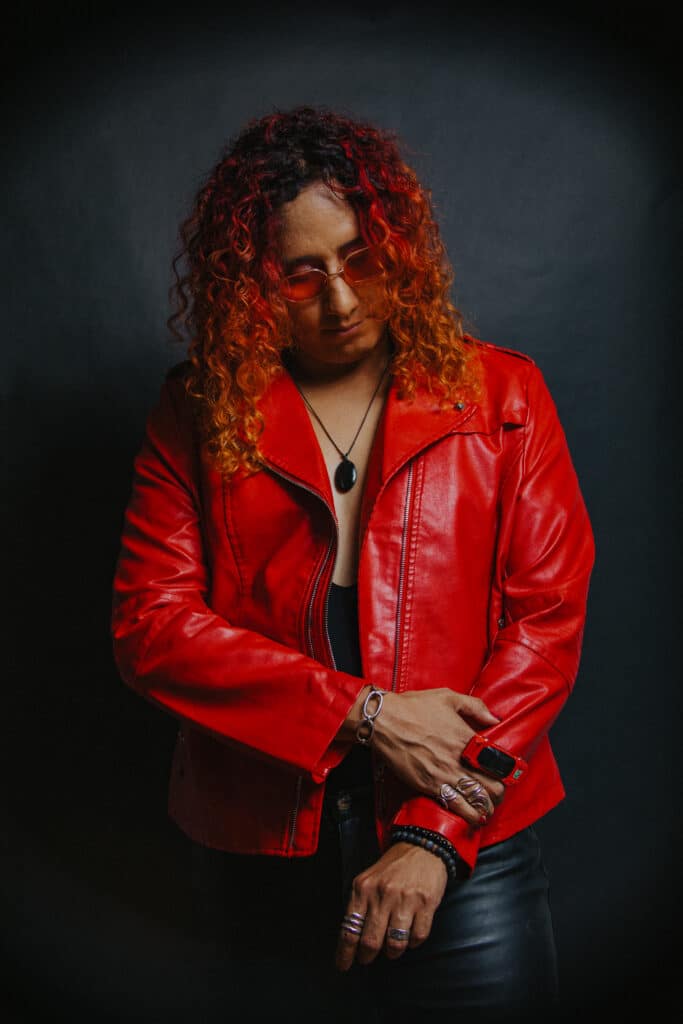
“I Found Myself” is your latest tune, and saw you team up with Neuro Dimension. What’s the story behind this tune? How did it come to life?
I first met Neuro Dimension through a group chat with a few other producers that my friend Mr. Stilo had started. Over time, the more we shared music with each other, the more we noticed a similarity in our styles—even our DJ styles are fairly similar. We had talked about getting in the studio for a while, but our schedules kept getting in the way. One day, he hit me up and said he had something he thought I’d vibe with.
As soon as I heard the vocals, I loved them. The original beat he sent over was a lot slower—probably around 115–118 BPM—and leaned more into that EDM sound with big leads. But the low end wasn’t hitting right. I was pivoting into making more techno around that time, and I knew the track needed a rolling bassline to really lock in. I added that along with some emotional plucks in the drop, I’m a sucker for a good pluck.
For the second verse, I wanted to switch it up to add some contrast, so I gave it a chill, almost trappy kind of vibe to keep things interesting. We went back and forth a few times til it all sounded right. One of the last changes we made was actually raising the tempo. It sounded great slower, but I knew at that BPM, it probably wouldn’t make it into my sets. Once we sped it up a bit, it locked in, and now it fits perfectly into both of our sets.
You’re also the co-founder and A&R for Better Together Records. How do you balance your time between your DJ career and this?
It’s definitely not easy to balance both. For me, it’s felt more like a pivot than a split focus. I spend most of my time producing and cranking out records for my own project, and then I’ll switch gears and dig through demos to see what stands out. I’ll also stockpile like 5–10 episodes for Better Together Radio and schedule those out to keep things moving and allow myself more time for writing music.
Right now, my main priority is absolutely my EMMBER project. It took years to develop my sound and my brand, and I finally feel like I’m in a great spot with both. There was also a long stretch where I was helping release a lot of other artists’ music, but not putting out much of my own. I’m finally back in that flow and committed to building momentum.
At the same time, I’m in the process of building out my team for both Better Together and my EMMBER project, so things can move more fluidly. There are only so many hours in the day, but so much to do every day.
Is there anything specific you keep an ear out for when sifting through demos to sign for the label?
I’m always looking for something that cuts through the noise. Too much music sounds the same nowadays, and I’m not really interested in playing it safe. I want tracks that stand out, take risks, and bring something fresh to the table, maybe even combine something that’s never been combined before.
At the same time, it still has to move the dance floor. I love testing out demos live, but honestly, I usually know within the first few seconds of listening to them if it’s a fit. I tend to gravitate toward music that would work in my sets, but that doesn’t mean it has to sound like my own tracks. It just needs that energy. My playing style is very versatile, but if something doesn’t fit my sets, chances are it won’t work for other DJs at that level either. So for me, it has to feel unique, but still hit where it counts.
I’m also looking at the artists themselves. Do they have a vision for their project? Are they active on socials, building a community, and investing in what they’re creating? I meet artists all the time who don’t believe in investing in their music. That really blows my mind, especially when you think about how long some of these songs take to bring to life, not to mention the actual cost of making professional-quality records. Why wouldn’t you want to invest in yourself? If you won’t invest in your own art, how can you expect anyone else to?
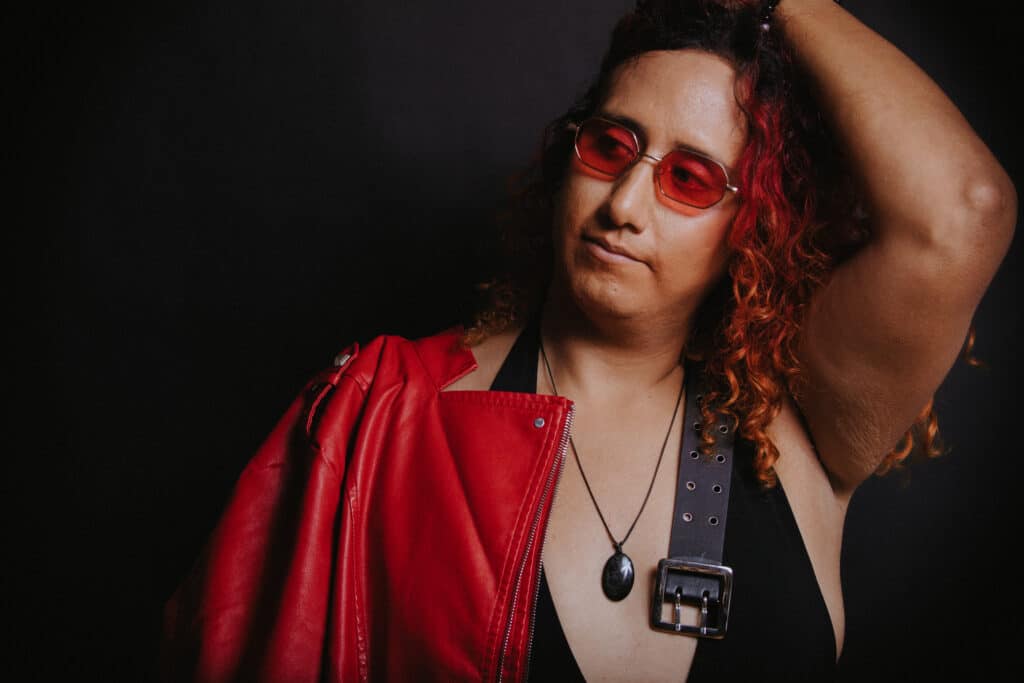
House and techno were born from the Black and LGBTQ+ communities in cities like Chicago, Detroit, and New York, yet the past few decades have seen a shift away from its roots. What are your thoughts on representation in the current era of the scene?
The scene still doesn’t have nearly enough representation. The history often gets overlooked, and it’s important we keep reminding people where this culture actually comes from, because the scene has lost touch with those roots. Representation matters because it shows people what’s possible. It’s hard to imagine being a trans world-touring DJ when you rarely see any other trans DJs in that space. We need Black and queer artists to be visible and heard—not just for the sake of visibility, but to inspire the next wave of artists.
When I see someone like me crushing it on stage, it lights something up in me. I can actually see myself doing it. Without that, it’s much harder to visualize. As artists, we’re in the inspiration business—inspiring others is essential. If we’re going to talk about representation, it has to go beyond visibility. It needs to be backed by real opportunity and meaningful support.
Right now, the scene is still very dominated by cis white male DJs. The ratio is slowly improving, but it’s taking way too long. Organizations like Book More Women have done great work raising awareness on how male-dominated the industry is, but the pace of change has been painfully slow.
I remember seeing the EDC Las Vegas 2025 flyer breakdown and the numbers speak for themselves:
- 2025 – 18.6% Women / 0.3% Nonbinary / 81.0% Men (0 trans women / 0 trans men)
- 2024 – 18.3% Women / 0.0% Nonbinary / 81.7% Men (1 trans woman / 0 trans men)
That’s not diversity, especially for the biggest music festival in North America.
And while festivals and clubs have made some moves to diversify lineups, a lot of it still feels like box-checking. You’ll see one queer or Black artist buried in a sea of cis white men. Most of the time, those artists get slotted into early sets or side stages instead of being trusted with prime-time slots. It still feels like a surface-level representation.
If you could give any piece of advice to other LGBTQ+ members of the scene, what would it be?
Always be true to yourself, even when it’s hard. Not everyone is going to vibe with you, and that’s totally okay—your authenticity will attract your people. Don’t be afraid to speak your mind and be you.
Once you stop caring what other people think, you’ll really start to live. I didn’t come out until later in life because I spent too much time worried about being liked. But once I let that go and started living unapologetically as myself, everything shifted. Real, genuine people started showing up in my life, and so did some amazing opportunities.
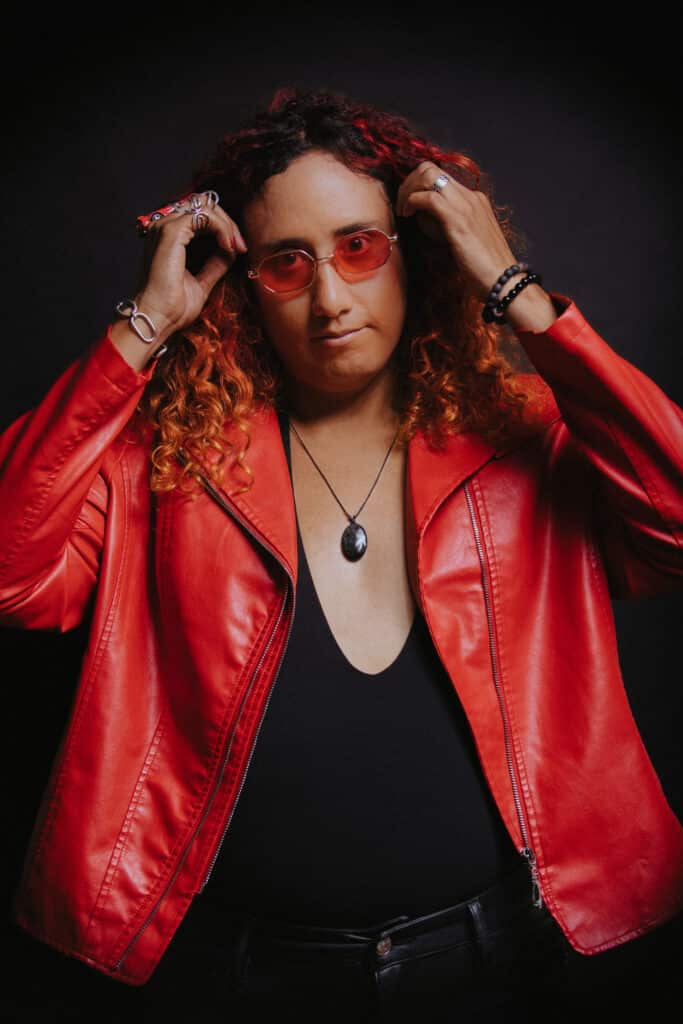
You’ve lived in other cities throughout the US but call Los Angeles home. What’s your favorite thing about living in Southern California and being involved in its thriving scene?
I love how strong the creative community is in Los Angeles. Every creative field, from film, TV, music, and fashion, you name it, is represented here, so there’s a ton of opportunity. Since so many people work across multiple industries, collaboration happens pretty naturally.
One of my favorite songs I’ve made was with my friend Terrell Carter, an actor and singer in tons of TV shows and films. We met at a party, instantly clicked, and within a week, we were in the studio writing our song “Hero.” He’s incredibly talented, and it’s honestly super hard to find people like that in other cities.
The ceilings are just higher here. LA is super innovative, and no matter what field you’re in, there’s room to dream big and actually make it happen.
I also love the lifestyle here. I’m originally from Chicago, so I grew up with brutal weather for most of the year. Living somewhere with amazing weather year-round is phenomenal. I love hiking, and being surrounded by nature has become a big part of how I stay inspired. I spend long hours in the studio, so being able to step out and hit a trail helps me clear my head, stay active, and stay inspired.
I live close to the beach, so I’m there at least a few times a week, even in the winter. I didn’t grow up with easy access to the beach, so having it right there now is super important to me because, over the years, I’ve learned how grounding it is for me. There’s just something about being near the ocean that helps reset my energy and clears out all the mental noise.
Is there something you’d like to see the scene in Los Angeles and elsewhere embrace more of in the future?
The first thing that jumps to mind is more emphasis on mental health. I love how organizations like End Overdose have grown in the last few years and helped save so many lives—I really hope that continues. But we also need more support around mental health, especially for artists.
As fun as being a DJ and producer is, there are definitely many high highs and low lows. It’s a tough and demanding field, and it can be really isolating. Most days, I’m in the studio alone for hours trying to finish a track. I love what I do, but it can definitely be mentally draining—and honestly, lonely. That feeling hits even harder on the road. And when you mix in drugs or alcohol, it can become a dangerous slope if you’re not careful.
I’m bringing this up because just last week, I lost a close friend to suicide. He was one of the kindest, most hardworking artists I’ve ever known—and now he’s gone. It breaks my heart. And the truth is, this happens way too often in our scene. If we don’t start prioritizing mental health more seriously—as a community and as an industry—I’m afraid it won’t stop.
I know Fredy Lane had a podcast with Insomniac for a while that created a safe space for artists to open up, which was amazing, but that ended after some time. I wish there were more stuff like that. I really think it would help destigmatize mental health and make seeking therapy feel more normal for so many people.
We need more of that—maybe something like an industry therapist program, where labels help cover the cost or something supported by MusiCares. I don’t know the exact solution, but I do know we need to keep having these conversations. Because at the end of the day, we are a community, and we’ve got to look out for each other.
Finally, what goals do you hope to achieve in the rest of 2025?
I’ve been releasing a song every week this year, so one of my main goals is to finish that out strong and hit 52 releases by the end of the year. I’m also working on getting a few of those tracks signed to bigger labels.
On the live side, I’d love to start playing some bigger venues here in LA. I’ve played Academy already, but I’d love to hit the main stage later this year and get a few solid direct support slots. I’ve also got my eye on places like Exchange and Sound.
Another big goal is to put together a small West Coast tour. I’ve mostly stayed in LA these past few years, but it feels like the right time to get shows lined up in places like San Diego, San Francisco, Portland, and Seattle. I’m also hoping to play a show back in Chicago—I haven’t performed there since I moved to LA, and that would be a full-circle moment for me.
And as I mentioned earlier, I’m focused on building out my team for the EMMBER project and the label, so things can run more smoothly as everything grows. You always hear it takes 10 years to become an “overnight success.” This is my 10th year producing. After all the late nights and grinding behind the scenes, I’m just now starting to see the momentum build. It’s exciting, and I’m ready to keep showing up and pushing forward.
Follow EMMBER:
Website | Facebook | X | Instagram | SoundCloud | YouTube | TikTok



